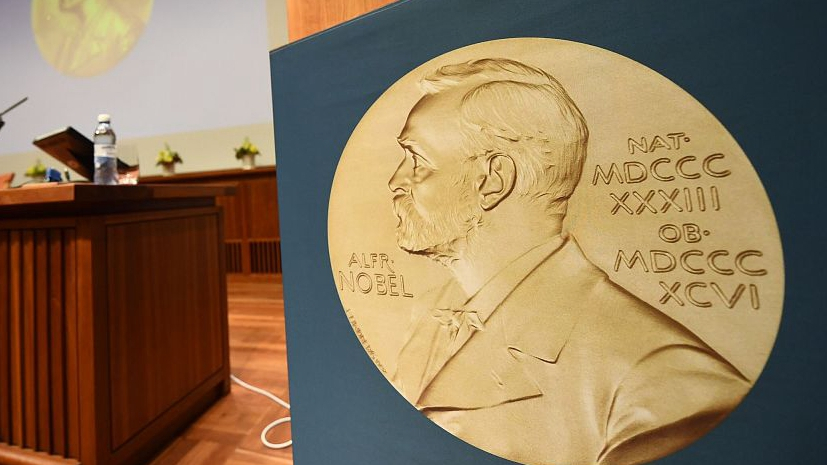
A medal of Alfred Nobel is pictured prior to a press conference announcing the winner of the 2017 Nobel Prize in Medicine in Stockholm, Sweden, October 2, 2017./VCG Photo
A medal of Alfred Nobel is pictured prior to a press conference announcing the winner of the 2017 Nobel Prize in Medicine in Stockholm, Sweden, October 2, 2017./VCG Photo
The Nobel Prize – around the world, these two words evoke greatness, accomplishment, a unique contribution to humanity. As the 2019 laureates are about to be announced, what is the story behind the Nobel Prize, who are some of its most prominent recipients and how are they chosen?
The prize is the brainchild of Alfred Nobel, a Swedish inventor and businessman born in 1833, who is credited with inventing dynamite and reportedly held 355 patents on everything from explosives to barometers and artificial rubber.
Upon his death in 1896, he ordered that his entire fortune of 31 million Swedish krona – about 1.8 billion krona or 182 million U.S. dollars in today's money – be used to set up five prizes for "those who, during the preceding year, shall have conferred the greatest benefit to humankind."
These became the Nobel Prizes, which are awarded every year, most famously for Peace and Literature, but also Physics, Chemistry and Physiology or Medicine.
In 1968, an additional prize was added, for Economic Sciences, following a donation by Sweden's central bank to the Nobel Foundation.
How is the Nobel Prize awarded?
Although rumors about potential laureates circulate ever year, the selection process is notoriously secretive and shortlists of nominees are not made public.
A year before the prizes are announced, Nobel Committees invite select figures from each field – including university professors and former laureates – to submit nominations. After a long evaluation process and consultations with experts, each committee submits a list of final candidates.
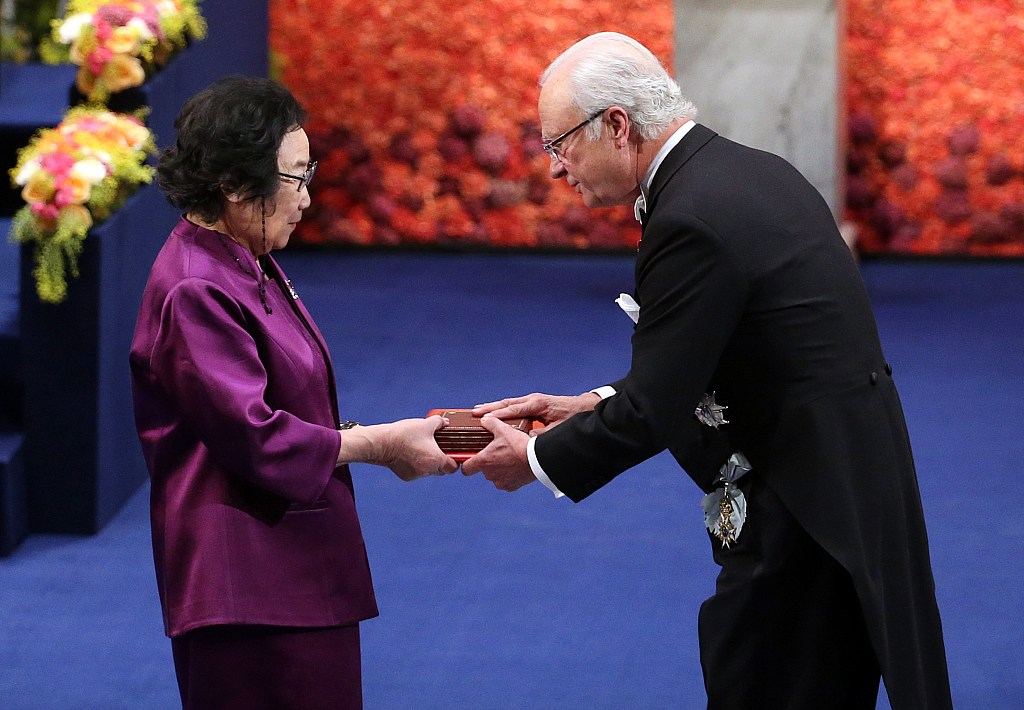
Nobel Prize laureate in Medicine Tu Youyou receives her medal from King Carl XVI Gustaf of Sweden during the 2015 Nobel Prize Award ceremony in Stockholm, Sweden, December 10, 2015. /VCG Photo
Nobel Prize laureate in Medicine Tu Youyou receives her medal from King Carl XVI Gustaf of Sweden during the 2015 Nobel Prize Award ceremony in Stockholm, Sweden, December 10, 2015. /VCG Photo
The prizes for Physics, Chemistry and Economic Sciences are then decided by the Royal Swedish Academy of Sciences, while the Literature and Medicine prizes are decided by separate Swedish institutions.
The Peace Prize differs from the others in that it is determined by a Norwegian Nobel Committee and given out at a ceremony in Oslo, not Stockholm.
Since 1974, a new rule states that no prize can be awarded posthumously.
Laureates are awarded a medal, a diploma and prize money, which in 2019 will be nine million krona (913,000 U.S. dollars) – to be divided equally if a prize is shared.
Since 1901, a total 590 Nobel Prizes have been handed out to 935 laureates – some prizes have been shared between two or more people. Only 51 laureates have been women.
Not just individuals have been recognized: out of the 935 laureates, 27 were organizations, such as the International Atomic Energy Agency (IAEA), the European Union, the Intergovernmental Panel on Climate Change (IPCC) or Doctors without Borders.
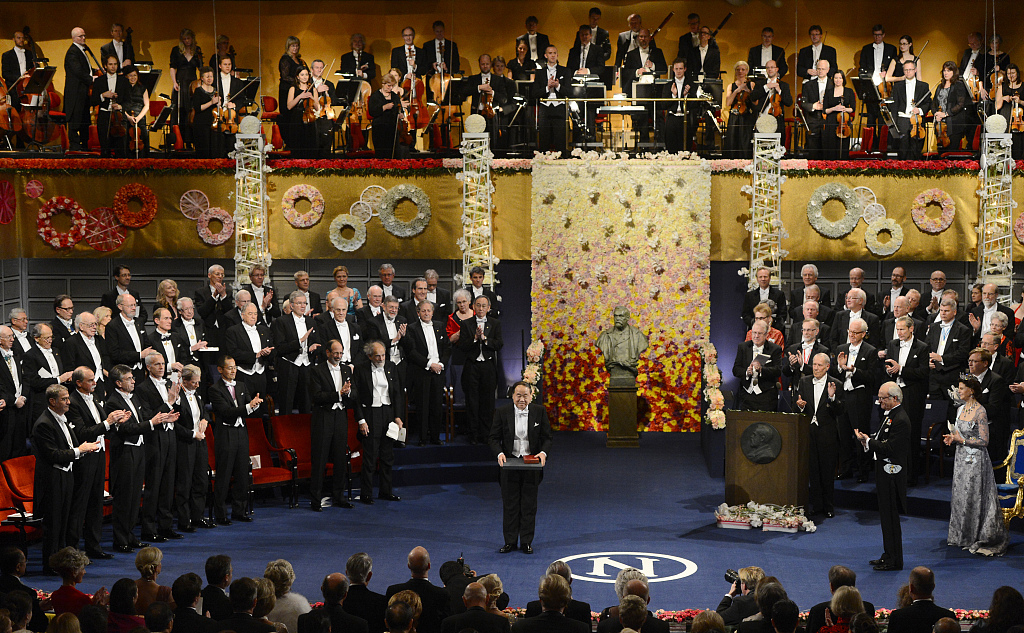
Chinese writer Mo Yan is applauded after receiving the 2012 Nobel Prize in Literature in Stockholm, Sweden, December 10, 2012. /VCG Photo
Chinese writer Mo Yan is applauded after receiving the 2012 Nobel Prize in Literature in Stockholm, Sweden, December 10, 2012. /VCG Photo
In 118 years, there have been only three years when no Nobel Prizes were given out in any category: from 1940 to 1942. On other occasions, academies and committees have not awarded one or the other Prize for lack of a suitable recipient.
Many Nobel Prize winners have become household names – Peace laureates like Mother Teresa, Martin Luther King Jr. and Nelson Mandela, or Literature winners like Kazuo Ishiguro, Ernest Hemingway and George Bernard Shaw. But some have also made history while remaining in the shadows.
First woman: Marie Curie shared the 1903 Nobel Prize in Physics with her husband Pierre and fellow Frenchman Henri Becquerel for their work on radioactivity. She was also the first person to receive a second Nobel Prize, this time in Chemistry in 1911.
Youngest winner: Malala Yousafzai, the Pakistani teenager who became a global icon for children's education after being shot by the Taliban, was awarded the Nobel Peace Prize in 2014 at age 17.
Oldest winner: Arthur Ashkin was 96 years old when he received the Nobel Prize in Physics in 2018 for developing "optical tweezers."
Three-time winner: the International Committee of the Red Cross (ICRC) won the Nobel Peace Prize in 1917, 1944 and 1963, the only laureate to achieve that feat. Separately, its founder Henri Dunant, also won it in 1901.
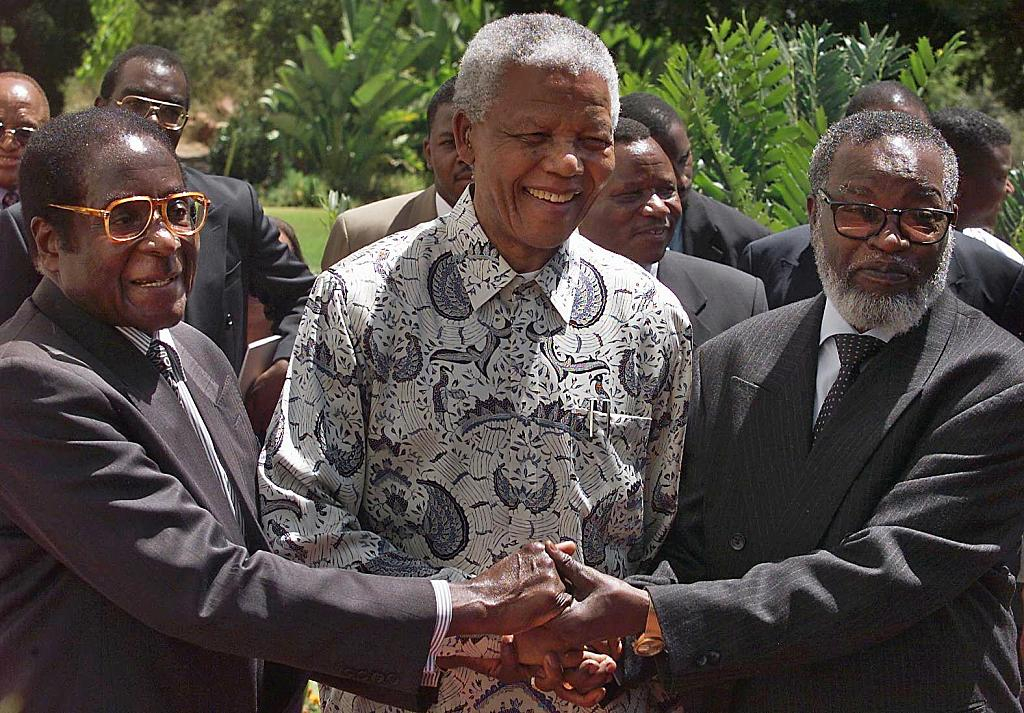
South African President Nelson Mandela (C), 1993 Nobel Peace Prize laureate, is pictured in Pretoria, South Africa, March 5, 1999. /VCG Photo
South African President Nelson Mandela (C), 1993 Nobel Peace Prize laureate, is pictured in Pretoria, South Africa, March 5, 1999. /VCG Photo
Two-time winners: besides Curie, three other scientists won double Nobels: John Bardeen in Physics in 1956 and 1972; Frederick Sanger in Chemistry in 1958 and 1980; and more unusually, Linus Carl Pauling for Chemistry in 1954 and then Peace in 1962 for his efforts to ban nuclear weapons. The UN Refugee Agency UNHCR also took home the Peace Prize twice, in 1954 and 1981.
Successful relatives: Pierre and Marie Curie were not the only celebrated scientists in their family: their daughter Irene and her husband Frédéric Joliot also won a Nobel Prize in Chemistry in 1935. Dutch brothers Jan and Nikolaas Tinbergen were awarded Nobel Prizes separately, for Economic Sciences in 1969, and Physiology or Medicine in 1973. Six father-son pairs have also received the honor, either together or separately, over the years.
First Chinese: Yang Chen Ning and Lee Tsung Dao were awarded the Nobel Prize in Physics in 1957 for their work on elementary particles.
First Chinese woman: Tu Youyou won the Nobel Prize in Physiology or Medicine in 2015 for discovering a new treatment for malaria.
Other notables:
- Albert Einstein: perhaps the most famous scientist of all, he won the Nobel Prize in Physics in 1921 "for his services to Theoretical Physics."
- Winston Churchill: the former British prime minister won a Nobel Prize in 1953, unusually, in Literature.
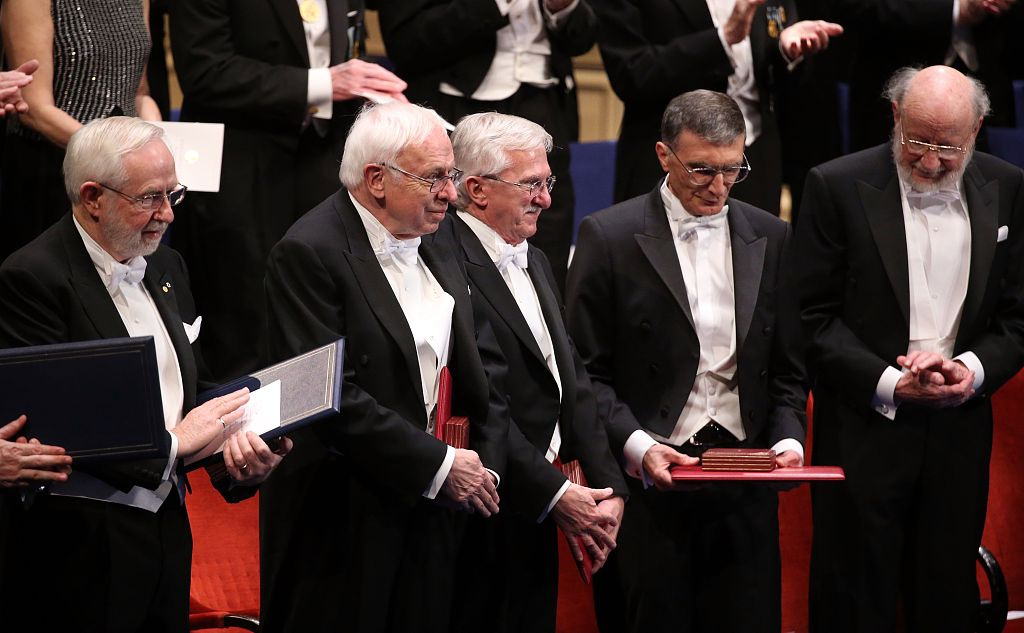
From L to R: Physics laureate Arthur B. McDonald, Chemistry laureates Tomas Lindahl, Paul Modrich and Aziz Sancar, and Medicine laureate William C. Campbell stand with their medals at the 2015 Nobel Prize Award ceremony in Stockholm, Sweden, December 10, 2015. /VCG Photo
From L to R: Physics laureate Arthur B. McDonald, Chemistry laureates Tomas Lindahl, Paul Modrich and Aziz Sancar, and Medicine laureate William C. Campbell stand with their medals at the 2015 Nobel Prize Award ceremony in Stockholm, Sweden, December 10, 2015. /VCG Photo
- Luc Montagnier and Françoise Barré-Sinoussi received the Nobel Prize in Physiology or Medicine in 2008 for discovering the human immunodeficiency virus (HIV), and shared the prize with Harald zur Hausen, who discovered the human papillomavirus (HPV) that causes cervical cancer.
- Bertha von Suttner: the second woman after Marie Curie to win a Nobel Prize – for Peace in 1905 – von Suttner was not only a prominent anti-war campaigner but also a close friend of Alfred Nobel and is credited with convincing him to set up the Peace Prize.
The 2019 recipients are being announced on October 7-14, starting with Physiology or Medicine, followed by Physics, Chemistry, Literature, Peace and Economic Sciences.
The prizes will then be handed out, as is the tradition, at two ceremonies in Stockholm and Oslo on December 10, the anniversary of Alfred Nobel's death.